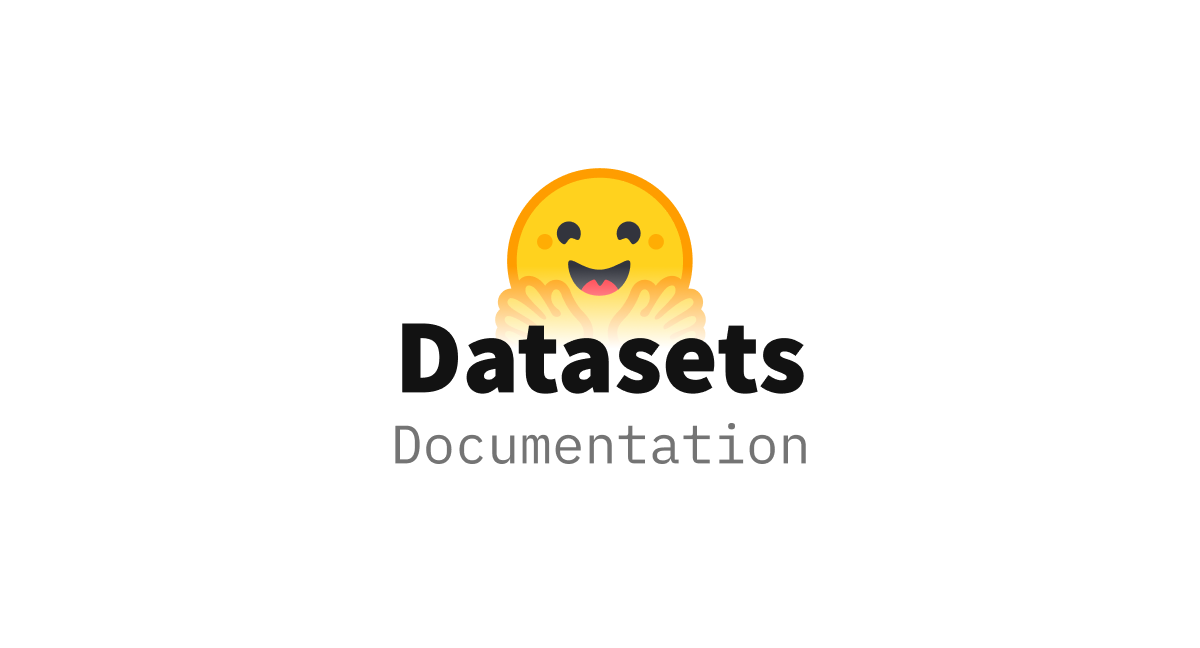Creating Custom Datasets Using HuggingFace datasets Builder Class
- 9/22/2024
- Update: 9/22/2024
- HuggingFace
Hello. This time I’ll introduce how to create custom datasets that can be called from HuggingFace datasets. This article specifically focuses on methods using Builder classes. This is essentially the same as what’s covered here:
Premise: Methods for Creating Datasets in HuggingFace
There are broadly three methods for creating custom HuggingFace datasets:
- Prepare files or directories with specific structures in advance and use
datasets.load_dataset - Define dicts or generators and use
datasets.Dataset.from_*functions - Use
datasets.DatasetBuilderclass to define dataset loading in code (the method introduced today)
1. Prepare files or directories with specific structures in advance and use datasets.load_dataset
First, the file reading method loads pre-prepared files in formats like csv, json directly with the load_dataset function as shown in the following link:
For example, for csv format files, load them as follows:
import datasets as ds
dataset = ds.load_dataset(
"csv",
data_files={"train": ["my_train_file_1.csv", "my_train_file_2.csv"], "test": "my_test_file.csv"}
)This is simple since you just need to prepare files in advance.
The directory reading method creates split directories like train, validation under specific directories as shown in the following link, then loads those directories with the load_dataset function:
hoge/dataset_root/train/label/1.png
hoge/dataset_root/train/label/2.png
...
hoge/dataset_root/test/label/1.png
hoge/dataset_root/test/label/2.png
...import datasets as ds
dataset = ds.load_dataset("imagefolder", data_dir="hoge/dataset_root")This method can also be used for audio files by using audiofolder instead of images.
2. Using datasets.Dataset.from_* functions
This method allows creating datasets by passing Python functions or dictionaries as shown in the following tutorial:
For example, when passing a dictionary, create it as follows:
import datasets as ds
dataset_dict = {
"text": ["hoge", "fuga"]
"label": [1, 3]
}
dataset = ds.Dataset.from_dict(dataset_dict)When passing a generator, create it as follows. You can pass arguments to the generator function in gen_kwargs and the number of parallel processes in num_proc:
import os
import datasets as ds
dataset_data = [
{"summary": "hoge", "class": 1},
{"summary": "fuga", "class": 2},
]
def generator(data):
for d in data:
yield {
"text": d["summary"],
"label": d["class"]
}
dataset = ds.Dataset.from_generator(generator,
gen_kwargs={"data": dataset_data},
num_proc=os.cpu_count() // 2)Personally, I think the most convenient method is using generators with datasets.Dataset.from_generator. It’s handy and recommended since you can create datasets in parallel while reshaping original data in the script.
3. Using datasets.DatasetBuilder class
This is the method I’ll introduce today. I’ll write about it in detail later.
Main Topic: Overview of Dataset Creation Using datasets.DatasetBuilder Class
I’ll introduce the main topic of this article: dataset creation methods using Builder classes like datasets.DatasetBuilder. This time I’ll use datasets.GeneratorBasedBuilder among Builder classes. First, let me summarize the advantages of using Builder classes, then introduce the actual creation code.
Benefits
Using Builder classes provides the following advantages:
- Can define methods to obtain dataset files and prepare them
- Can handle formats not supported by HuggingFace datasets or datasets requiring complex preparation
- Can bundle multiple datasets
While methods 1 and 2 using load_dataset or from_generator functions required advance downloading and directory preparation, using Builder classes allows defining preparation operations as code, making it possible to share HuggingFace datasets by sharing only Python scripts.
Evaluation metric repositories for models using multiple datasets like JMTEB and JGLUE already published on HuggingFace are defined with Builder classes. The multilingual dataset wikimedia/wikipedia used for language model pre-training can switch languages by calling as follows, and Builder classes can handle such complex divisions:
from datasets import load_dataset
ds = load_dataset("wikimedia/wikipedia", name="20231101.en")Related Classes and Objects
When defining datasets, we use several related classes and objects:
datasets.BuilderConfigDefines dataset names, versions, data_dir, etc. needed to call datasets with Builder classes. When bundling multiple datasets, you’ll define multiple of these.datasets.DatasetInfoDefines dataset information including citation, homepage, and element types in the dataset.datasets.SplitGeneratorDefines dataset splits. For example, if a dataset contains splits like train, val, test, you’ll define that many.datasets.GeneratorBasedBuilderDefines a class to create Datasets based on the above three classes.
Implementation
Let’s actually create a JapaneseTextDataset that bundles Japanese corpus livedoor News Corpus and llm-book/japanese-wikipedia using datasets.GeneratorBasedBuilder.
We’ll obtain livedoor News Corpus from the web and use llm-book/japanese-wikipedia as uploaded to HuggingFace.
The directory structure is as follows:
JapaneseTextDataset/
└── JapaneseTextDataset.pyHere’s the content of JapaneseTextDataset.py. I’ll explain it step by step:
from dataclasses import dataclass
from pathlib import Path
from typing import Literal, Optional
import datasets as ds
@dataclass
class LivedoorCorpusConfig(ds.BuilderConfig):
"""BuilderConfig for LivedoorCorpus"""
def __init__(self, name: str = "livedoor", **kwargs):
super().__init__(name, **kwargs)
@dataclass
class WikiJPConfig(ds.BuilderConfig):
"""BuilderConfig for WikiJP"""
def __init__(self, name: str = "wiki", **kwargs):
super().__init__(name, **kwargs)
class JapaneseTextDataset(ds.GeneratorBasedBuilder):
"""Japanese Text Dataset"""
VERSION = "1.0.0"
DEFAULT_CONFIG_NAME = "wiki"
BUILDER_CONFIGS = [
WikiJPConfig(
version=ds.Version(version_str=VERSION), description="Japanese Wikipedia"
),
LivedoorCorpusConfig(
version=ds.Version(version_str=VERSION), description="Livedoor News Corpus"
),
]
def _info(self) -> ds.DatasetInfo:
if self.config.name == "wiki":
return ds.DatasetInfo(
homepage="https://huggingface.co/datasets/llm-book/japanese-wikipedia",
features=ds.Features(
{
"text": ds.Value("string"),
}
),
)
elif self.config.name == "livedoor":
return ds.DatasetInfo(
homepage="http://www.rondhuit.com/download.html#ldcc",
features=ds.Features(
{
"url": ds.Value("string"),
"title": ds.Value("string"),
"text": ds.Value("string"),
}
),
)
def _split_generators(self, dl_manager: ds.DownloadManager):
if self.config.name == "wiki":
dataset = ds.load_dataset(
"llm-book/japanese-wikipedia",
trust_remote_code=True,
)
return [
ds.SplitGenerator(
name=ds.Split.TRAIN,
gen_kwargs={"data": dataset["train"]},
)
]
elif self.config.name == "livedoor":
file_path = dl_manager.download_and_extract(
"http://www.rondhuit.com/download/ldcc-20140209.tar.gz"
)
return [
ds.SplitGenerator(
name=ds.Split.TRAIN,
gen_kwargs={"file_path": file_path, "split": "train"},
),
ds.SplitGenerator(
name=ds.Split.TEST,
gen_kwargs={"file_path": file_path, "split": "test"},
),
]
def _generate_examples(
self,
data: Optional[ds.Dataset] = None,
file_path: Optional[str] = None,
split: Literal["train", "test"] | None = None,
):
if self.config.name == "wiki":
if data is None:
raise ValueError("data must be specified")
for i, example in enumerate(data):
yield i, {"text": example["text"]}
elif self.config.name == "livedoor":
if file_path is None:
raise ValueError("file_path must be specified")
if split is None:
raise ValueError("split must be specified")
paths = [
p
for p in (Path(file_path) / "text").glob("*/*.txt")
if p.name != "LICENSE.txt"
]
if split == "train":
paths = paths[: int(len(paths) * 0.8)]
else:
paths = paths[int(len(paths) * 0.8) :]
for i, path in enumerate(paths):
with open(path, "r", encoding="utf-8") as f:
url = f.readline().strip()
title = f.readline().strip()
text = f.read()
yield i, {"url": url, "title": title, "text": text}datasets.BuilderConfig
In the following part of the above code, we define BuilderConfigs for Livedoor and Wikipedia:
@dataclass
class LivedoorCorpusConfig(ds.BuilderConfig):
"""BuilderConfig for LivedoorCorpus"""
def __init__(self, name: str = "livedoor", **kwargs):
super().__init__(name, **kwargs)
@dataclass
class WikiJPConfig(ds.BuilderConfig):
"""BuilderConfig for WikiJP"""
def __init__(self, name: str = "wiki", **kwargs):
super().__init__(name, **kwargs)This time we’re not doing anything special, but when adding arguments when calling load_dataset, do it as follows:
@dataclass
class WikiJPConfig(ds.BuilderConfig):
"""BuilderConfig for WikiJP"""
def __init__(self, name: str = "wiki", language: str = "ja", **kwargs):
super().__init__(name, **kwargs)
self.language = "ja"In the above example, we added a language argument. This way, when loading the dataset, you can pass the language argument as follows:
dataset = ds.load_dataset("JapaneseTextDataset", name="wiki", language="ja")datasets.GeneratorBasedBuilder
The JapaneseTextDataset class inheriting datasets.GeneratorBasedBuilder sets VERSION, DEFAULT_CONFIG_NAME, and BUILDER_CONFIGS.
When enabling multiple dataset calls, list multiple datasets.BuilderConfig in BUILDER_CONFIGS.
DEFAULT_CONFIG_NAME sets which config_name is called when nothing is specified in load_dataset. The default value is "default".
class JapaneseTextDataset(ds.GeneratorBasedBuilder):
"""Japanese Text Dataset"""
VERSION = "1.0.0"
DEFAULT_CONFIG_NAME = "wiki"
BUILDER_CONFIGS = [
WikiJPConfig(
version=ds.Version(version_str=VERSION), description="Japanese Wikipedia"
),
LivedoorCorpusConfig(
version=ds.Version(version_str=VERSION), description="Livedoor News Corpus"
),
]datasets.GeneratorBasedBuilder::_info
The _info function of datasets.GeneratorBasedBuilder returns dataset information in datasets.DatasetInfo format. At this time, you can reference the contents of BUILDER_CONFIGS with self.config, allowing dynamic changes to dataset information being called.
def _info(self) -> ds.DatasetInfo:
if self.config.name == "wiki":
return ds.DatasetInfo(
homepage="https://huggingface.co/datasets/llm-book/japanese-wikipedia",
features=ds.Features(
{
"text": ds.Value("string"),
}
),
)
elif self.config.name == "livedoor":
return ds.DatasetInfo(
homepage="http://www.rondhuit.com/download.html#ldcc",
features=ds.Features(
{
"url": ds.Value("string"),
"title": ds.Value("string"),
"text": ds.Value("string"),
}
),
)datasets.GeneratorBasedBuilder::_split_generators
The _split_generators(self, dl_manager: ds.DownloadManager) function of datasets.GeneratorBasedBuilder defines what splits the dataset has with ds.SplitGenerator and returns them as a list. The gen_kwargs of SplitGenerator defines arguments to pass to _generate_examples which returns one data row later.
This time, since "llm-book/japanese-wikipedia" is obtained from HuggingFace, we call load_dataset internally.
Since Livedoor News Corpus is downloaded from the web, we write the download in the script and pass the storage destination to gen_kwargs.
Using dl_manager.download_and_extract performs download and extraction from URL at once, so we use this.
def _split_generators(self, dl_manager: ds.DownloadManager):
if self.config.name == "wiki":
dataset = ds.load_dataset(
"llm-book/japanese-wikipedia",
trust_remote_code=True,
)
return [
ds.SplitGenerator(
name=ds.Split.TRAIN,
gen_kwargs={"data": dataset["train"]},
)
]
elif self.config.name == "livedoor":
file_path = dl_manager.download_and_extract(
"http://www.rondhuit.com/download/ldcc-20140209.tar.gz"
)
return [
ds.SplitGenerator(
name=ds.Split.TRAIN,
gen_kwargs={"file_path": file_path, "split": "train"},
),
ds.SplitGenerator(
name=ds.Split.TEST,
gen_kwargs={"file_path": file_path, "split": "test"},
),
]datasets.GeneratorBasedBuilder::_generate_examples
The _generate_examples function of datasets.GeneratorBasedBuilder defines how to return one dataset entry. Arguments receive the gen_kwargs defined in the earlier _split_generators. Since it’s defined as a generator, we use yield syntax.
def _generate_examples(
self,
data: Optional[ds.Dataset] = None,
file_path: Optional[str] = None,
split: Literal["train", "test"] | None = None,
):
if self.config.name == "wiki":
if data is None:
raise ValueError("data must be specified")
for i, example in enumerate(data):
yield i, {"text": example["text"]}
elif self.config.name == "livedoor":
if file_path is None:
raise ValueError("file_path must be specified")
if split is None:
raise ValueError("split must be specified")
paths = [
p
for p in (Path(file_path) / "text").glob("*/*.txt")
if p.name != "LICENSE.txt"
]
if split == "train":
paths = paths[: int(len(paths) * 0.8)]
else:
paths = paths[int(len(paths) * 0.8) :]
for i, path in enumerate(paths):
with open(path, "r", encoding="utf-8") as f:
url = f.readline().strip()
title = f.readline().strip()
text = f.read()
yield i, {"url": url, "title": title, "text": text}Calling the Dataset
This completes dataset construction. Let’s actually call the dataset. You can call it with a script like this:
import datasets as ds
# Load the dataset
dataset = ds.load_dataset("./JapaneseTextDataset", "wiki", trust_remote_code=True)
print(dataset)
# Load the dataset
dataset = ds.load_dataset(
"./JapaneseTextDataset", "livedoor", trust_remote_code=True
)
print(dataset)The execution results are as follows:
ja_wiki.jsonl: 100%|████████████████████████████████████████████████████████████████████████████████████████████████████████████████████████████| 6.37G/6.37G [00:53<00:00, 38.7MB/s]
Generating train split: 1363395 examples [00:38, 35532.80 examples/s]
Generating train split: 1363395 examples [03:22, 6731.14 examples/s]
DatasetDict({
train: Dataset({
features: ['text'],
num_rows: 1363395
})
})
Downloading data: 31.6MB [00:00, 50.9MB/s]
Generating train split: 5893 examples [00:01, 3227.36 examples/s]
Generating test split: 1474 examples [00:00, 2580.49 examples/s]
DatasetDict({
train: Dataset({
features: ['url', 'title', 'text'],
num_rows: 5893
})
test: Dataset({
features: ['url', 'title', 'text'],
num_rows: 1474
})
})The dataset was successfully called.
Uploading to HuggingFace Hub
To upload the created dataset to HuggingFace, just push the JapaneseTextDataset directory created earlier as-is.
As shown in the following template, if you write dataset information in README.md, it will be used directly:
Also, the following repository uploads JGLUE to HuggingFace and even includes CI/CD, making it very helpful for reference:
That concludes this brief introduction to creating HuggingFace datasets using Builder classes.


